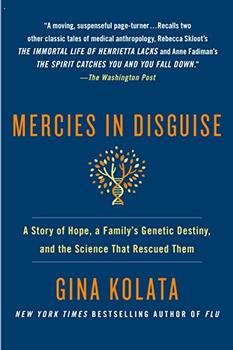Summary | Excerpt | Reading Guide | Reviews | Beyond the Book | Readalikes | Genres & Themes | Author Bio

A Story of Hope, a Family's Genetic Destiny, and the Science That Rescued Them
by Gina Kolata
Tim and Buddy — both medically trained themselves — decided they would have to take matters into their own hands.
The brothers devised a plan. They would get some of Bill's tissue and have it analyzed — or at the very least store it in case it could help someday to solve the mystery.
But what tissue? Bill had a neurological disorder, that was clear, so perhaps the first thing to examine would be the fluid that bathed their father's brain. There was a remote chance Bill had a condition called normal pressure hydrocephalus. If a doctor removes about a third of the fluid from a person's spinal column, the person is temporarily able to walk normally again, instantly. It was certainly worth a try, they agreed.
The two brothers explained their plan to Bill, who nodded with a blank expression, unable to talk, unable to question his sons but trusting them implicitly. Tim and Buddy drove their father to Buddy's office.
It felt strange — doctors do not treat their family members, doctors do not insert needles into their own fathers. But now it had become essential, they decided, that they be doctors first, sons second.
They dressed their father in a hospital gown then bent him over, baring his rounded back. Tim stared at the rail-like ribs protruding from his father's sagging pale skin. His muscles were wasted; he looked like such an old man. He pushed these thoughts to the side, trying to be impartial, professional, trying to pretend the patient in front of him was not his father. He gave his father an extra dose of lidocaine, a numbing medication. Tim spoke to his father softly. "Dad, you are going to feel a little pressure in your back and maybe a tingle in your leg." Then, gently he slid a long needle into his father's spinal column. The fluid dripped out slowly, reminding Tim of what it must be like to tap a maple tree. Buddy left the room to care for other patients, and Bill, soothed by Tim's gentle touch, fell asleep.
After nearly an hour, it was done. Tim had collected all he safely could — 40 milliliters of spinal fluid — filling four long tubes. "Dad, it's time to wake up," Tim murmured, lightly nudging his father. "Let's see how you are doing."
He and Buddy turned Bill on his side chatting with him while they waited the requisite half hour before sitting him up. The concern is that patients can get a headache if they sit up too soon after losing so much spinal fluid. Then they helped their father off the table. They were hoping for an instantaneous change when Bill woke up, a sudden ability to walk, the troubling symptoms vanished. Unlikely, yes, but possible.
As soon as they got their father off the table and onto his feet, however, Buddy and Tim knew they had failed. No change.
They did not let on their disappointment. "Let's go home and get some lunch and we'll see how you do," Tim said to Bill.
Now, at least, the brothers had a sample of their father's spinal fluid. Tim had held the tubes up to the light, looking for any discoloration, which could be a sign of rampant infection or inflammation or bleeding. Nothing. The liquid was as clear as pure spring water. But perhaps something in that fluid, some protein or chemical imbalance, might hold a clue to the disease. They were flummoxed about what the next step should be.
They didn't even know what test to request if they were to send it to a lab for analysis. They would store the fluid until they had a better idea of how to use it. They carefully placed the tubes in a freezer in Buddy's office.
Sometime later they had a new idea. Maybe, the brothers thought, Bill had a storage disease, a type of rare disorder caused when cells cannot rid themselves of certain substances — each disease involves a different substance. Like normal pressure hydrocephalus, storage diseases were part of their medical school curriculum. But the diseases were so rare that neither Buddy nor Tim had seen any patients with one. They knew it was extremely unlikely that Bill had such a condition, and they knew testing for it was a real shot in the dark, but they felt they had to try. So they decided to take a little plug of skin from Bill's forearm and send it to the Medical University of South Carolina where it could be analyzed. The result would tell them if their hunch — their hope — was correct. Once again, Bill nodded his mute assent.
From Mercies in Disguise by Gina Kolata. Copyright © 2017 by the author and reprinted by permission of St. Martin's Press.
Nearly all men can stand adversity, but if you want to test a man's character, give him power.
Click Here to find out who said this, as well as discovering other famous literary quotes!
Your guide toexceptional books
BookBrowse seeks out and recommends the best in contemporary fiction and nonfiction—books that not only engage and entertain but also deepen our understanding of ourselves and the world around us.